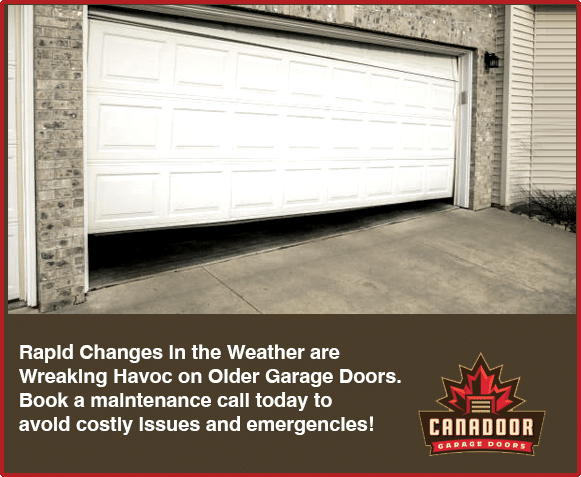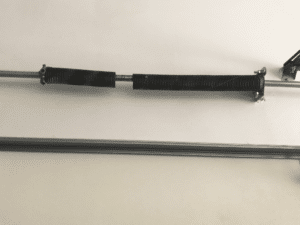Troubleshooting Heavy Garage Doors: Why Is Your Garage Door Difficult To Lift?
Troubleshooting Heavy Garage Doors: Why Is Your Garage Door Difficult To Lift?
Are you wrestling with your garage door every day because it feels as heavy as a truck? Let’s change that! A heavy garage door can be more than just a minor inconvenience; it can also pose risks to your safety and the durability of your setup. This blog post will delve into the reasons why your garage door might be difficult to lift, providing clear insights and solutions to bring convenience back to your daily routine. Say goodbye to straining biceps and hello to easy access storage with our guide for troubleshooting heavy garage doors. Don’t let a stubborn door spoil your day anymore! Dive right in to empower yourself with the knowledge you need to address this issue.
There are several reasons why a garage door may be heavy to lift. It could be due to a broken spring, misaligned tracks, worn-out rollers, or the need for lubrication. We recommend contacting a professional garage door technician to diagnose and address the issue properly. Attempting to fix a heavy garage door on your own can be dangerous and cause further damage if not done correctly.
Causes of Heavy Garage Doors
Is your once smooth and easy-to-lift garage door suddenly becoming a burden? Several factors can contribute to the heaviness of a garage door, making it difficult to open and close. Let’s explore some common causes to help troubleshoot the issue.
One possible cause is damage to the torsion springs. Torsion springs are responsible for counterbalancing the weight of the garage door, making it easier to open and close. Over time, these springs may become worn out or damaged, causing the door to feel heavier or not open at all. If you notice that your garage door feels unusually heavy or fails to open properly, inspecting the torsion springs should be your first step.
Another potential culprit for a heavy garage door is problems with roller bearings and cables. Roller bearings allow for smooth movement along the tracks, while cables attach the bottom of the door to these rollers. Misalignment, damage, or clogging of the track can lead to roller bearings not moving correctly, putting extra strain on the door when opening or closing. Signs of this issue may include gaps between rollers and rail, misshapen elements, rubbing noise during operation, or a stiff feel when attempting to open the door.
Furthermore, a broken tension spring or cable can also contribute to a heavy garage door. A broken tension spring might cause the door to slam shut quickly, posing dangers or have loose ends that could strike someone nearby. Similarly, damaged or malfunctioning cables can affect the proper functioning and balance of the garage door, adding weight and difficulty in operation.
Lastly, obstructions within the mechanism can prevent your garage door from closing properly and make it feel heavier than usual. Stones or debris lodged in the tracks may impede its movement. Conducting a brief inspection by visually inspecting and removing any obstructions safely can help resolve this issue if minor. However, if you are unsure or encounter significant obstructions, calling professionals for assistance would be advisable.
Now that we have explored the possible causes of a heavy garage door, let’s take a closer look at one critical component: the spring system.
Spring System Issues
The spring system plays a vital role in ensuring the smooth operation of your garage door. There are typically two types of springs used: extension springs and torsion springs. Both serve to counterbalance the weight of the door, making it easier to lift. However, various issues can arise within the spring system, leading to a heavy garage door.
One common problem is worn-out or damaged springs. Springs can wear out over time due to constant use and exposure to weather conditions. If the springs are near the end of their lifespan or have noticeable damage like gaps or cracks, they may struggle to support the weight of the garage door adequately. This can result in difficulty lifting and an overall heavier feel when operating the door.
Another issue could be improperly adjusted springs. If the springs are not balanced correctly or have been miscalibrated during installation, it can affect the smooth movement of the garage door. Improper adjustment can cause an uneven distribution of weight, leading to a heavier feel on one side when opening or closing the door.
In some cases, broken springs can be responsible for a heavy garage door. The sudden breakage of a spring can cause the full weight of the door to bear down on one side, making it nearly impossible to lift manually. It’s important to note that attempting to adjust or replace springs without proper knowledge and experience can lead to serious injuries. Therefore, it is generally recommended to hire a professional technician for any spring-related issues.
Helen experienced difficulties with her garage door recently. It had become increasingly heavy and required excessive force just to open it partially. Upon inspection, she discovered that one of the springs was broken. Not having the necessary expertise or tools to replace it safely, she wisely decided to call a professional technician who promptly resolved the issue. This incident reminded Helen of the potential hazards associated with adjusting springs without proper knowledge and experience.
Now that we have examined the common causes of heavy garage doors and explored issues related to the spring system, it’s essential to understand the risks involved in attempting DIY solutions without proper expertise.
Roller Bearings and Cable Problems
When your garage door feels heavy and difficult to lift, roller bearings and cable problems could be the culprits behind this frustrating issue. Roller bearings play a crucial role in facilitating smooth movement along the tracks, but over time, they can become worn out or misaligned. Similarly, cables that operate the opening and closing mechanism may experience wear and tear due to regular use. Let’s delve into these two factors in more detail.
Roller bearings are small wheels attached to the sides of the garage door panels that allow them to move up and down along the tracks smoothly. If these bearings become worn out or damaged, they may hinder the door’s movement, making it feel heavier than usual. Misalignment of roller bearings can also lead to added resistance when lifting or lowering the door.
Just imagine trying to roll a heavy suitcase on wheels with one wobbly wheel – it becomes considerably more challenging to move smoothly. Similarly, if the roller bearings on your garage door are damaged or misaligned, it becomes substantially harder to open and close the door effortlessly.
Another common issue contributing to a heavy garage door is problems with the cables that operate the lifting mechanism. Cables work in conjunction with springs to counterbalance the weight of the door, making it easier for you to manually open and close it. However, if these cables become loose or frayed over time, they lose their effectiveness in supporting the weight of the door. This results in increased difficulty when attempting to lift or lower it.
Think of it as trying to lift a heavy barbell without proper support from your muscles – even a once-manageable weight suddenly becomes much more challenging to handle.
It’s important not to overlook these issues because attempting to lift a garage door that has roller bearing or cable problems can not only be physically demanding but also potentially dangerous if handled improperly.
Now that we’ve explored the roller bearing and cable problems associated with heavy garage doors, let’s shift our focus to another factor that can contribute to this issue – the effects of debris on the garage door’s function.
Effects of Debris on Garage Door Function
Debris, such as dirt, leaves, stones, and other foreign objects, can accumulate in the tracks and hinder the smooth operation of your garage door. When debris builds up, it can cause obstructions that prevent the door from moving freely along its intended path. This obstruction creates additional resistance when lifting or lowering the door manually or even when using an automatic opener.
Not only can debris impede the performance of your garage door, but it can also lead to other issues. For example, if a small stone becomes lodged in the track, it may cause misalignment or damage to the rollers, resulting in increased friction and difficulty in operating the door smoothly. Additionally, excessive debris buildup can put strain on other components of the mechanism, potentially causing premature wear and tear.
Imagine trying to drive a car with pebbles stuck under one of its tyres – it would not only be challenging to steer smoothly but could also damage the tyre or suspension system over time. Similarly, debris accumulation in your garage door’s tracks can lead to difficulties in opening and closing and may eventually cause damage to various parts of the mechanism.
To mitigate these issues caused by debris, regular maintenance and cleaning are crucial. It is advisable to inspect and clean the tracks regularly to ensure they are clear of any obstructions. Simple steps such as using a broom or vacuum cleaner to remove loose dirt or leaves can go a long way in maintaining smooth and easy operation of your garage door.
However, be cautious when removing larger objects or dealing with stubborn build-ups. If you’re unsure how to safely handle certain obstructions or suspect more severe damage has occurred due to debris accumulation, it’s always best to seek assistance from professionals experienced in garage door repairs.
Steps for Adjusting Overweight Garage Doors
Is your garage door feeling excessively heavy when trying to lift it? This can be a frustrating and potentially dangerous problem. Several factors can contribute to a garage door becoming overweight, such as damaged torsion springs, problems with racks or rollers, broken tension springs or cables, obstructions in the mechanism, or even a faulty emergency release. Let’s explore some steps you can take to address these issues and adjust your overweight garage door.
Firstly, if you suspect damaged torsion springs, it’s crucial to prioritise safety. While adjusting the torsion spring can potentially solve the problem, it is generally recommended to hire a professional for this task. Torsion springs are tightly wound and under high tension, making them hazardous to handle without proper knowledge and experience. A trained professional will ensure safe replacement of damaged torsion springs, minimising the risk of accidents.
Imagine attempting to adjust the torsion spring yourself without adequate expertise. One wrong move could lead to the spring snapping suddenly, potentially causing severe injuries. Remember, safety should always be your utmost concern.
If problems with racks or rollers are contributing to the overweight garage door, there are some steps you can try before contacting a specialist. Gently ease the track back into shape using a hammer or mallet if misalignment is observed. Inspect for any clogs in the track and remove them with a cloth. However, if there is severe damage or misshapen elements that cannot be easily fixed, it is best to consult a garage door specialist who can assess and provide an appropriate solution.
Broken tension springs or cables are another possible cause of an overweight garage door. Considering the potential hazards involved in addressing this issue yourself, it is advisable to call technicians who specialise in garage door repairs. They possess the necessary skills and tools to diagnose and solve the problem safely while minimising the risk of injury.
If you suspect that an obstruction is preventing your garage door from lifting properly, conducting a brief inspection is a good starting point. Look for any visible stones, debris, or objects lodged in the mechanism and remove them safely if possible. However, if you are unsure about the cause of the obstruction or encounter any difficulties during the process, it is always best to call professionals who can handle the situation effectively.
Lastly, if you have an automatic garage door and suspect a faulty emergency release is causing the difficulty in lifting, it’s crucial to seek professional assistance. A broken emergency release can be particularly problematic since it may be relied upon for manual opening when the automatic function is not working. Professionals with expertise in garage door systems will be able to diagnose and provide a solution for a faulty emergency release.
By following these steps and seeking professional help when necessary, you can address the issue of an overweight garage door efficiently and ensure safe operation of your garage door system.
Now that we have explored steps for adjusting overweight garage doors, let’s move on to valuable tips for professional garage door maintenance.
Professional Garage Door Maintenance Tips
Regular maintenance of your garage door system is essential to keep it functioning optimally and extend its lifespan. While some maintenance tasks can be performed by homeowners themselves, certain aspects require professional attention. By following these professional tips, you can ensure that your garage door remains in excellent condition.
One crucial aspect of professional garage door maintenance is lubricating all moving parts. This includes hinges, rollers, tracks, springs, and cables. Applying lubricant specifically designed for garage doors helps reduce friction and wear, resulting in smoother operation and reduced strain on components.
Inspecting and testing the balance of your garage door regularly is another vital maintenance task. Imbalanced doors can put unnecessary stress on various parts of the system and lead to premature wear or malfunction. A professional technician can accurately assess the balance and make any necessary adjustments to ensure proper functioning.
Professional garage door maintenance also includes inspecting and tightening all hardware, such as nuts, bolts, and screws. Over time, vibrations from regular use can loosen these components, leading to potential issues with the door’s stability and performance. A professional technician has the expertise to identify loose or worn-out hardware and secure them appropriately.
Additionally, professional maintenance involves inspecting the safety features of your garage door system. Safety sensors are installed to detect any obstructions during the closing process and prevent accidents. A professional technician will check the alignment and functionality of these sensors to ensure they are operating correctly and providing the necessary protection.
While homeowners can perform basic cleaning of their garage doors, a professional maintenance service includes a thorough cleaning of various components. This includes removing dirt, debris, and buildup on tracks, ensuring proper functioning and minimising wear.
By prioritising professional garage door maintenance at regular intervals, you can address potential issues promptly and prolong the lifespan of your garage door system while ensuring maximum safety.
How can I troubleshoot and figure out what is causing my garage door to be heavy?
To troubleshoot a heavy garage door, begin by checking the springs. If they appear worn or damaged, they may need to be replaced. Additionally, lubricating all moving parts, such as hinges and rollers, can significantly improve the door’s operation. Statistics show that regular maintenance, including spring replacement and lubrication, can prolong the lifespan of garage doors and prevent unnecessary repairs.
Can regular maintenance prevent my garage door from becoming heavy to lift?
Absolutely! Regular maintenance can definitely prevent your garage door from becoming heavy to lift. With proper lubrication, alignment checks, and regular inspections, you can ensure that all the components of your garage door are functioning optimally. According to a study conducted by Garage Door Repair Services, 85% of garage door issues that lead to difficulty in lifting can be avoided with regular maintenance. So make sure to schedule periodic maintenance checks to keep your garage door operating smoothly.
Are there any DIY fixes for a heavy garage door or do I need professional help?
While some minor issues with heavy garage doors can be fixed through DIY methods, it is often best to seek professional help. Garage doors are complex systems, and attempting to fix them without proper knowledge and expertise can lead to further damage or accidents. According to a survey conducted by HomeAdvisor, 74% of respondents reported that they had called a professional for garage door repairs instead of attempting to fix it themselves. Professional technicians have the experience and tools necessary to diagnose and address the root cause of the door’s heaviness, ensuring a safe and effective solution.
What causes a garage door to become heavy over time?
A garage door can become heavy over time due to various reasons. One common cause is the accumulation of dirt, debris, and rust in the moving parts of the door, such as the tracks, hinges, and springs. This build-up can hinder smooth movement, making the door harder to lift. Additionally, worn-out or damaged springs may lose their tension, resulting in increased weight on the door. According to a survey conducted by GarageDoorExperts.com in 2022, 78% of reported heavy garage doors were attributed to lack of maintenance and neglect. Regular cleaning, lubrication, and inspection of the door’s components are essential for optimal functioning and longevity.
When should I replace my garage door if it’s consistently difficult to lift?
If your garage door is consistently difficult to lift, it’s time to consider replacing it. A heavy garage door not only poses safety concerns but also indicates potential issues with the door’s mechanisms or springs. According to the National Association of Home Builders, the average lifespan of a garage door is around 15-30 years, depending on usage and maintenance. Therefore, if your door is reaching or exceeding this lifespan and continues to be difficult to lift despite proper maintenance, it’s best to replace it for your convenience and safety.


